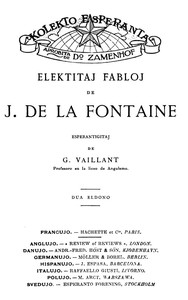Elektitaj fabloj de J. de La Fontaine by Jean de La Fontaine
"Elektitaj fabloj de J. de La Fontaine" by Jean de La Fontaine is a collection of fables translated into Esperanto, likely written in the late 19th century. The text is a reinterpretation of classic fables attributed to the ancient storyteller Aesop, with themes focusing on moral lessons conveyed through stories featuring anthropomorphized animals. The opening of the work includes an introduction that highlights the significance of fables in imparting moral teachings and
reflects on the challenges of translating literary works into Esperanto, a constructed international language. It sets the stage by explaining the context and motivation behind the translation, aiming to demonstrate how Esperanto can effectively express rich literary traditions. Following the introduction, the first fable titled "The Cicada and the Ant" introduces a tale about the careless cicada who sings throughout summer while the industrious ant prepares for the winter, serving as a cautionary tale about foresight and responsibility. (This is an automatically generated summary.)
Read now or download (free!)
| Choose how to read this book | Url | Size | ||||
|---|---|---|---|---|---|---|
| Read online (web) | https://sendtokindle.compellingsciencefiction.com/ebooks/51690.html.images | 156 kB | ||||
| EPUB3 (E-readers incl. Send-to-Kindle) | https://sendtokindle.compellingsciencefiction.com/ebooks/51690.epub3.images | 130 kB |
Send
to kindle email: |
|||
| EPUB (older E-readers) | https://sendtokindle.compellingsciencefiction.com/ebooks/51690.epub.images | 131 kB | ||||
| EPUB (no images, older E-readers) | https://sendtokindle.compellingsciencefiction.com/ebooks/51690.epub.noimages | 108 kB | ||||
| Kindle | https://sendtokindle.compellingsciencefiction.com/ebooks/51690.kf8.images | 198 kB | ||||
| older Kindles | https://sendtokindle.compellingsciencefiction.com/ebooks/51690.kindle.images | 186 kB | ||||
| Plain Text UTF-8 | https://sendtokindle.compellingsciencefiction.com/ebooks/51690.txt.utf-8 | 105 kB | ||||
| Download HTML (zip) | https://www.gutenberg.org/cache/epub/51690/pg51690-h.zip | 115 kB | ||||
| There may be more files related to this item. | ||||||
About this eBook
| Author | La Fontaine, Jean de, 1621-1695 |
|---|---|
| Translator | Vaillant, G. |
| LoC No. | 93151455 |
| Title | Elektitaj fabloj de J. de La Fontaine |
| Note | Reading ease score: 64.9 (8th & 9th grade). Neither easy nor difficult to read. |
| Credits |
Produced by Andrew Sly and the Online Distributed
Proofreading Team at http: //www.pgdp.net (This book was produced from scanned images of public domain material from the Google Books project.) |
| Language | Esperanto |
| LoC Class | PQ: Language and Literatures: Romance literatures: French, Italian, Spanish, Portuguese |
| Subject | Fables, French -- Translations into Esperanto |
| Category | Text |
| EBook-No. | 51690 |
| Release Date | Apr 7, 2016 |
| Copyright Status | Public domain in the USA. |
| Downloads | 159 downloads in the last 30 days. |
| Project Gutenberg eBooks are always free! | |

